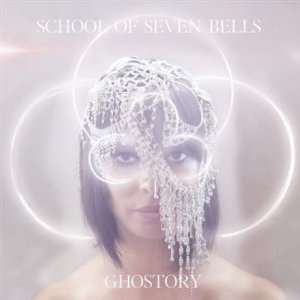School of Seven Bells inhabited an enjoyable niche of shoegaze-lite pop. Benjamin Curtis’ ethereal compositions were the perfect foil to the quasi-spiritualist chants and pageantry of twin vocalists Alejandra and Claudia. Third album, Ghostory, follows an arc of shedding: breadth of sound, duration (as each album becomes shorter) and now a member – Claudia left for ‘personal reasons’ – an upbeat statement suggests all was amicable, a mid-tour disappearance suggests otherwise. The result is a ‘concept’ album about a girl, Lafaye, and the ‘ghosts’ that haunt her.
Trimming back their signature embellishments leaves an album that strangely is more focused sonically, but somehow aimless in intention. Some tracks here are crisper and clearer, imposing themselves on the listener like none of their songs previously. However, they’ve pretty much shed the nuance, the Cocteau Twins influences, only vestiges of the hazey ecstatic-state cyclical riffs, the Peyote Church mysticalism that made them stand out. Heavily dependent on otherworldly detachment, they were never going to provide shocking creative left-turns. Instead they can only refine; in stripping back they expose their flaws.
Ghostory feels like a ‘movie,’ which is to say it aspires to the epic, but falls short of cinematic. Songs fizz, but crescendos fail to crash. Their palette has always aspired to the 80s conception of stadium sound – Crisp guitar riffs, harmonies and sing-a-long vocals. ‘The Night’ and ‘When You Sing’, bookending the album, would not feel wrong playing over the credits of a life-affirming Regan-era action film.
The new duo’s more direct, collaborative, and instinctive writing process yields mixed results. ‘Lafaye”s stomps and chants, ‘Scavenge’r’s enjoyable Industrial-lite metronome get it right, these songs are more up-tempo, more ominous, more assertive – more like their older work. The rest of the album must then be seen as the real fruit of their new approach. Spontaneity seems, counterintuitively, to have resulted in tracks that are more ponderous, lacking joy. ‘White Wind’, ‘Show Me Love’ and ‘Reappear’ create breathing space, which on an album so short, is simply unnecessary. Elements stand out: ‘Low Times” half snare, half clap rhythm; the slow motion dam break of ‘Love Play’. We’d be better rewarded with longer, subtler changes in dynamic. But no song is long enough to build mood, or give the ideas room to grow. Closer ‘When You Sing’ disappears in a puff of smoke, but does not feel like it intends to wrong foot.
The lyrical themes (love, loss, longing and separation; the symbolism of skin, hearts and touch) combine well with the spiritual tropes – love as sacramental. It is difficult not to interpret these ideas of shared flesh in light of the sundered twins. Reduced by half, vocally they pull in two directions; clearer sometimes, but others Alejandra’s voice is layered upon itself, attempting to recreate the dynamism that left with Cludia. Was she a creative pressure valve? A voice to temper ideas, encouraging subtlety that is largely absent? The shock of the split, the need to move on has seen them leave behind their charm.


